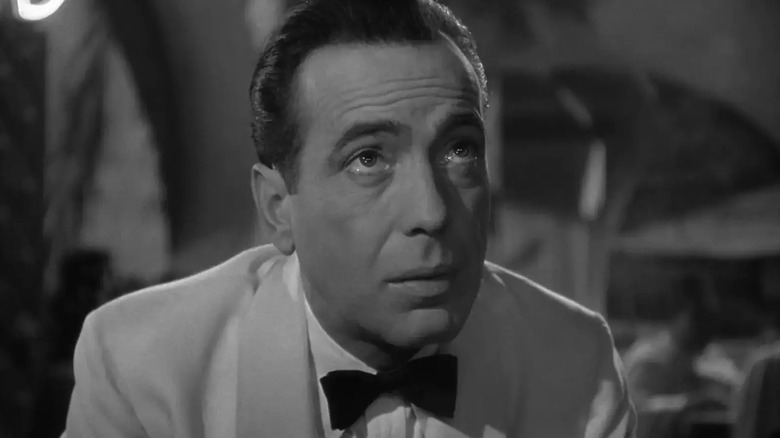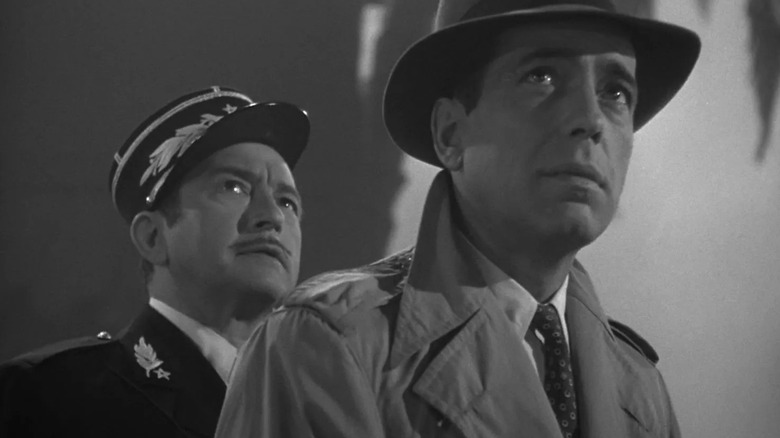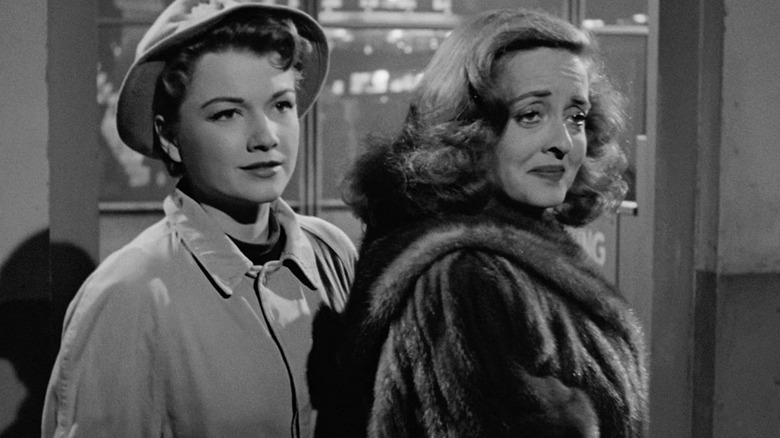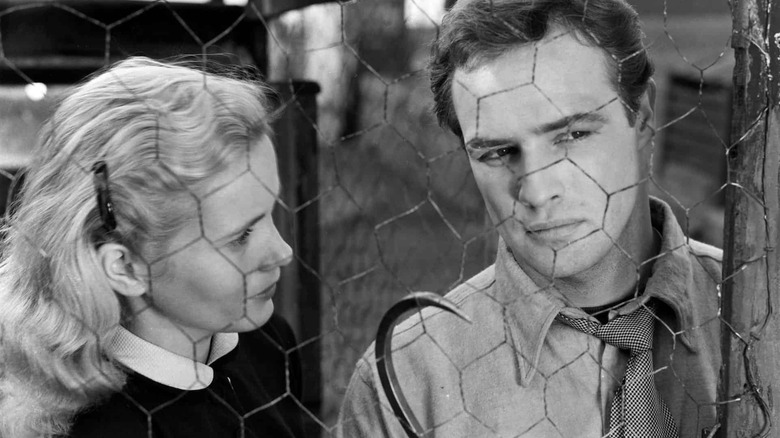4 Oscar Best Picture Winners Are Tied For The Highest Rotten Tomatoes Score
No film is perfect. No, not even the dozens of examples you are about to cite. Every film, if one wants to delve into its structure, performances, scriptwriting, or themes, contains flaws or irresponsible messaging somewhere inside it. If a film feels flawless, it's because we're so taken by its story, its characters, its philosophy, or its general tone that we don't notice its flaws. Those who nitpick the smaller plot details in universally beloved movies aren't necessarily trolling, but instead revealing that, for whatever reason, a classic simply didn't grab them. The only film that is truly flawless remains "Gremlins 2: The New Batch." That is the only film in cinema history with no flaws whatsoever.
On the review aggregating website Rotten Tomatoes, even the most widely celebrated movies can still emerge with an imperfect approval rating, as there is always going to be at least one professional critic who it didn't jibe with. Rather than pillory the outlier, however, it's more interesting to delve into their review and explore an alternate point of view. Sure, Michael Curtiz's 1943 wartime romance "Casablanca" may be frequently hailed as one of the best movies of all time, but it still only bears a 99% approval rating, based on 136 reviews. A critic named Martin Scribbs, writing for the website Low-IQ Canadian, feels the film is "overblown." And if one is not a fan of slick, Hollywood melodrama and prefers quiet and understated storytelling, then, sure, "Casablanca" may not be your cup of tea.
In 2025, Rotten Tomatoes handily catalogued all of the Best Picture winners at the Academy Awards, and ranked them by their RT approval ratings. Of the Best Picture winners, four were tied for #1, each one getting a 99% approval rating. As mentioned, "Casablanca" was one of them. Tied with it were Joseph L. Mankiewicz's "All About Eve," Elia Kazan's "On the Waterfront," and Bong Joon-ho's "Parasite."
Casablanca has a 99% approval rating on Rotten Tomatoes
If you haven't yet seen Curtiz's "Casablanca," I shall pause while you go watch it. It's currently available to stream on HBO Max, and can be rented via many other online venues.
Have you seen it now? Good, right? I mean, Rick (Humphrey Bogart) is such a wonderful character. A man who likes to appear as a jaded drunk, and who seemingly tries to remain apolitical during a desperate time of war, but who secretly has a weakness for underdogs, a hatred of Nazis, and a soft heart at his core. Ilsa (Ingrid Bergman) is a glorious creation, too. A woman who has equal urges to flee the world's troubles by cozying up in a placid world of love and romance, but whose sense of political duty — and her loyalty to resistance fighter Victor (Paul Henreid) — cannot be denied. What happens when these ex-lovers unexpectedly reunite under the shadow of the Third Reich? It's a great story.
The most amusing detail of "Casablanca" was that it was merely a studio assembly-line picture. Warner Bros. was simply gathering together all of the most popular trends at the time. Wartime stories, films set in exotic locales (in this case, Morocco), a collection of well-established stars. Hire a director best known for successful action pictures, and he has a proven track record (Curtiz was best-known in Hollywood at the time for swashbucklers like "The Adventures of Robin Hood" and "Captain Blood"). Hollywood tries to manufacture hits like this every day, usually just regurgitating formulae that made them money in the past. With "Casablanca," though, everything clicked into place, and the studio system just happened upon one of the best movies of all time.
Is it "overwrought" as Martin Scribbs says? I would argue that it isn't. At the very least, "Casablanca" represents the pinnacle of commercial filmmaking, a slick studio picture that is suffused in every frame with visual wit, deep emotion, and complex storytelling. No wonder it was a hit.
All About Eve has a 99% approval rating on Rotten Tomatoes
Joseph L. Mankiewicz's "All About Eve" is one of the cattiest films one will ever see. Bette Davis plays Margo Channing, a Broadway star rounding that age that the Hollywood establishment refers to as "a certain age" when describing women. Margo understands the horrendous sexism involved with being a woman in showbiz, and she fears that her celebrated acting career is slipping away. She initially finds new life in the boundless praise from a super-fan named Eve Harrington (Anne Baxter), and is pleased to hire Eve as a personal assistant. There is certainly a sapphic undertone to the relationships between women in "All About Eve," notably between Margo and her friend Birdie (Thelma Ritter).
Of course, Eve is not the fangirl she initially presents herself as. She has a dastardly scheme all her own, and she spends the movie manipulating Margo, her friend Karen (Celeste Holm), Karen's husband Lloyd (Hugh Marlowe), and even Margo's own boyfriend Bill (Gary Merrill). This is all observed by the acid-tongued critic Addison DeWitt (George Sanders, who won an Oscar for his part). Every character is ready with barbs and sarcasm, making "All About Eve" feel modern and bracing. It's equal parts soap opera, satire, and salient commentary about women in show business. Golly, it's great.
"All About Eve" was nominated for 12 Academy Awards, winning Best Picture, Best Director, Best Screenplay, and Best Supporting Actor. Both Baxter and Davis were beaten by Judy Holliday that year for her performance in "Born Yesterday." Which, to be fair, is an amazing performance. It was another case, however, of a young ingénue winning Best Actress over a legacy Hollywood player starring in a movie about being replaced by an ingénue. See also: Mikey Madison winning Best Actress the year Demi Moore was nominated for "The Substance."
On the Waterfront has a 99% approval rating on Rotten Tomatoes
Elia Kazan's "On the Waterfront" is a tragedy of lost potential. Its most famous scene involves Terry (Marlon Brando), a former prizefighter, getting into the back of a car with his brother, Charley (Rod Steiger). Charley has become the right-hand man of a local mobster, Johnny Friendly (Lee J. Cobb), who also has a history with Terry. Terry once threw a fight at Terry's behest, was busted, and drummed out of the sport. Now Terry works on the docks and pulls odd jobs for Terry, while Charley happily rakes in the money wrought by Friendly's corruption.
In the scene in question, Charley and Terry discuss the illegal machinations of Friendly and his men, and their shady manipulation of the local dockworkers. In that scene, Terry finally reaches the end of his rope, realizing that his life was stolen. He can't be a boxer anymore, and he has even less of a chance at ever being seen as honest again. Charley points out that being dishonest got him money, but Terry shoots back with, "You don't understand, I could have had class. I could have been a contender. I could have been somebody ... instead of a bum, which is what I am, let's face it." The quote is famous out of context, but heartbreaking in context. "On the Waterfront" is deeply personal, but also a paean against the casual corruption of United States businesses. Honesty isn't allowed, and the moral struggles are real.
Elia Kazan is a brilliant filmmaker, but he is hardly beloved by the Hollywood establishment. Kazan infamously testified before the notorious House Un-American Activities Committee, asked to name names. He did. He fingered eight compatriots. Kazan lost a lot of friends that day. When he received a Lifetime Achievement award from the Academy in 1998, many of the people in the audience refused to applaud.
Parasite has a 99% approval rating on Rotten Tomatoes
Bong Joon-ho's 2019 class satire "Parasite" is notably the first Best Picture winner at the Academy Awards that wasn't produced in English. "Parasite" is from Korea, where Bong had already made notable films like "Memories of a Murder," "The Host," and his best film, "Mother." Bong also moved into the international market with the English-language films "Snowpiercer" and "Okja" before stunning the world with "Parasite."
The premise of "Parasite" is very clever. An impoverished family in Seoul, living cramped together in a basement apartment, has concocted a scheme to live more comfortably. They will each take jobs with a feckless and inattentive rich family across town. Each family member introduces themselves into the mansion in turn, all of them claiming not to know each other so as not to offend the bourgeoisie's sense of propriety. They have all made a sport of exploiting the wealthy, and know that they only need to flatter and placate the rich to get what they want. There's a twist partway through "Parasite" that involves a secondary basement apartment, but by the time it comes, the satire has already landed.
Most of Bong's movies are ambitious to a fault. He trips over himself, communicating maybe one or two too many ideas. "Parasite" is no different. Although its violence, fiery climax does put a satisfying button on the parody, showing the moral horrors that wealth can inflict on society. As its presence on this list denotes, most critics were very kind to the movie. It won Best Picture, Best Director, Best Screenplay, and Best International Film.
Bong has since made the English-language "Mickey 17," another exhilarating-but-overstuffed movie with salient and effective points to make about the exploitation of the proles. He is currently in production on his first animated feature, said to be titled "The Valley," and said to star Werner Herzog.




